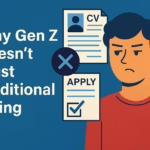Gen Z is entering the workforce — and they’re already checking out of the hiring process.
Raised on digital fluency, transparency, and feedback loops, this generation is met with forms that look like they were built in 2005, career sites that ask for the same information three times, and interviews that feel scripted and impersonal. Unsurprisingly, many don’t stick around long enough to complete the process. For HR leaders, that’s not just a UX problem — it’s a talent crisis in the making.
We often hear that Gen Z is hard to hire. But the reality is that our hiring systems weren’t built with them in mind. They were designed for a world where experience and pedigree were proxies for potential — where the right degree or company name could open doors. Gen Z isn’t playing by those rules. They want to be evaluated for who they are and what they can do, not just what’s printed on their CV.
So far, most technological “solutions” haven’t helped. AI-based CV filters and automated keyword-matching tools are accelerating the same systemic gaps — excluding those with nontraditional paths, limited work experience, or missing keywords. In trying to be efficient, we’ve become blind to potential.
But there is a shift underway — and it’s being led by organizations that are willing to break from tradition.
Across several pilots I’ve led in the UAE, we’ve worked with employers and universities to rethink early-career hiring using behavioral and skill-based assessments. Instead of scanning CVs or asking for referrals, we ask candidates to complete short, gamified tasks designed to measure qualities like collaboration, decision-making, and resilience. These aren’t hypothetical personality quizzes — they’re dynamic, real-time simulations grounded in behavioral science.
What we’ve discovered is that candidates who would never make it through the first stage of a CV screen are often the highest performers in these behavioral assessments. They’re thoughtful, adaptive, and quick under pressure — they just don’t have the conventional background to prove it. And more importantly, Gen Z responds well to the process. It feels more like an opportunity to show what they can do rather than defend what they haven’t done yet.
This isn’t about adding gimmicks. It’s about restoring fairness and relevance to hiring. If we want to attract — and retain — this generation, we need to build systems that reflect how they think, communicate, and learn. That means shifting from static credentials to dynamic capabilities. From output to process. From pedigree to potential.
HR leaders should ask: What are we really assessing? Are our filters screening out unqualified candidates — or just unfamiliar ones? Do our systems build trust with early-career applicants — or do they signal that only a certain type of profile is welcome?
We’re at an inflection point. Gen Z will soon make up the majority of the workforce. Their expectations around hiring, growth, and feedback are different — and in many ways, healthier. They want meaning, structure, and fairness. And if we meet them where they are, we’ll build stronger, more engaged, and more resilient teams.
But it starts with changing how we find them.
The post Why Gen Z Doesn’t Trust Traditional Hiring — and What HR Can Do About It first appeared on HR News.




